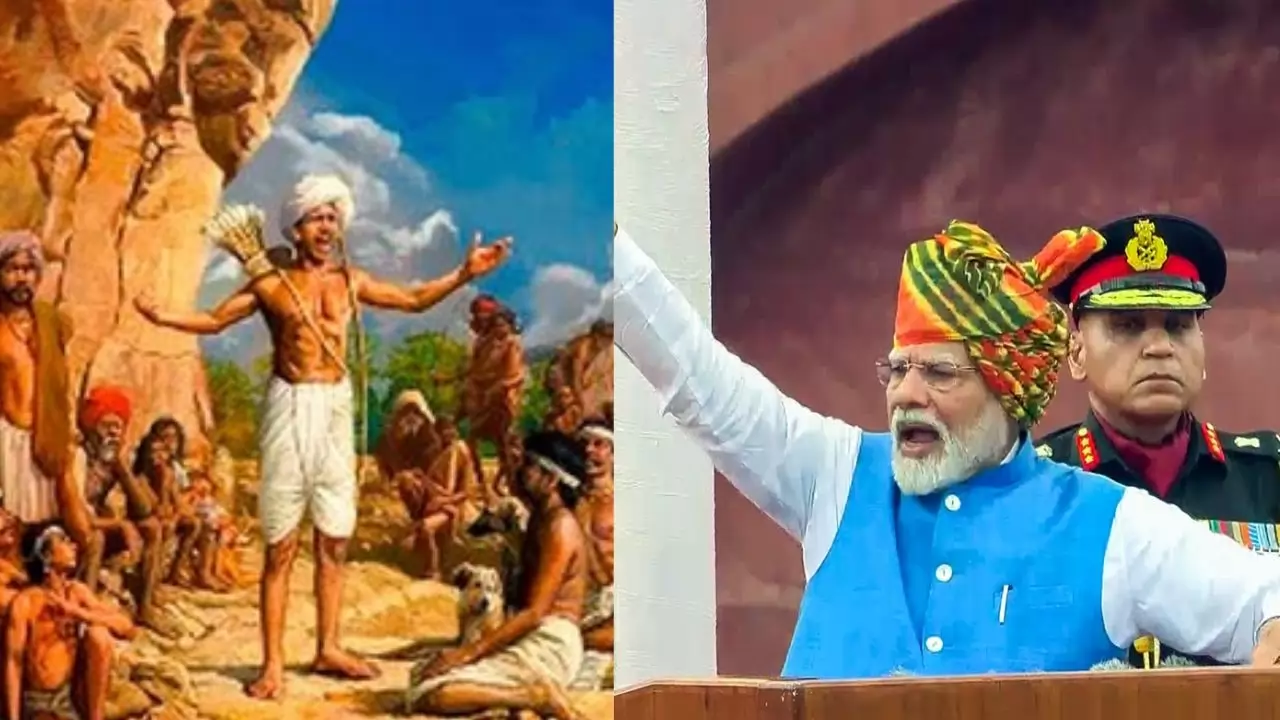
Birsa Munda and Prime Minister Narendra Modi (wikimediacommons/ANI)
On the occasion of India's 78th Independence Day, Prime Minister Narendra Modi hoisted the national flag at the Red Fort, addressing the nation under a cloudy sky and light rain. While highlighting several achievements and challenges, he also spoke about the freedom fighters and their sacrifices. “The country is indebted to them,” Modi stated, emphasizing the collective struggle that led to India’s independence.
Congress leader Mallikarjun Kharge took it to his Instagram handle, "Even today Sir made long wraps from Red Fort."
During his speech, which spanned over an hour, PM Modi acknowledged the contributions of Birsa Munda, a revered tribal leader often referred to as Bhagwan Birsa. However, he made an error while recounting the historical timeline, stating that Birsa Munda fought against the British before 1857. Modi highlighted Munda’s impact, saying, “Even before the freedom struggle, there was one young adivasi man who became a headache for the British forces. Just at the age of 20-22, this young man became a huge problem for the British. Today we know him as Bhagwan Birsa Munda and we worship him.”
The Prime Minister also noted the upcoming 150th birth anniversary of Birsa Munda, urging the nation to draw inspiration from his legacy. “He is an inspiration to all in our society. Birsa Munda shows how even the smallest man in society can bring about big change. Let us all come together and celebrate his 150th birth anniversary by increasing our love and compassion,” Modi added.
Birsa Munda was a prominent tribal leader and folk hero who played a significant role in the Indian freedom struggle, particularly in the tribal areas of Bihar and Jharkhand during the late 19th century. Born on November 15, 1875, in Ulihatu, present-day Jharkhand, Birsa belonged to the Munda tribe, a community known for its rich cultural heritage and deep connection to the land.
Birsa Munda is best known for leading the Munda Rebellion, also known as the Ulgulan (The Great Tumult), against the oppressive policies of the British colonial government and the exploitation of the tribal communities by landlords and missionaries. The movement, which took place between 1899 and 1900, sought to establish Munda Raj and expel the British from tribal lands. Birsa's leadership galvanized the tribals, and his vision for a Munda-led kingdom became a symbol of resistance.
Unfortunately, Birsa Munda's life was cut short at the young age of 25. He was arrested by the British in 1900 and died under mysterious circumstances in prison on June 9 of the same year. Despite his brief life, Birsa Munda's legacy as a champion of tribal rights and his role in India's freedom struggle continue to be celebrated, particularly in the states of Jharkhand, Odisha, West Bengal, and Bihar. His birth anniversary, November 15, is observed as Birsa Munda Jayanti and is also celebrated as Jharkhand Statehood Day.





Copyright © 2025 Top Indian News
